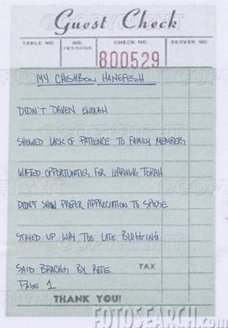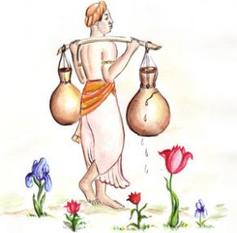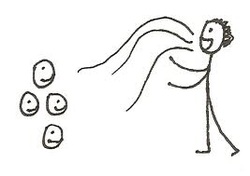 A delicious story for your Tu b'Shvat gala (puns intended) In a great oak forest where the trees grew tall and majestic, there was a little apple tree. It was the only apple tree in the forest and so it stood alone. Winter came. As the snow fell to the forest floor, it covered the branches of the little apple tree. The forest was quiet and peaceful. One night the little apple tree looked up at the sky and saw a wonderful site. Between the branchesof all the trees, the little apple tree saw the stars in the sky, which appeared to be hanging on the branches of the oak trees. "Oh God oh God," whispered a little apple tree, "how lucky those oak trees are to have such beautiful stars hanging on their branches. I want more than anything in the world to have stars of my branches, just like the oak trees have! Then I would feel truly special! God looked down the little apple tree and said gently, "Have patience! Have patience little apple tree!" Time passed. The snows melted and spring came to the land. Tiny white and pink apple blossoms appeared on the branches of the little apple tree. Birds came to rest on its branches. People walked by the little apple tree and admired it's beautiful blossoms. All summer long, the apple tree continued to grow. The branches of the tree formed a canopy overhead as they filled with leaves and blossoms. But night after night, the little apple tree looked up at the sky with the millions, and millions, and millions - and millions of stars and cried out, "Oh God, I want more than anything in the world to have stars in my tree and on my branches and in my leaves - just like those oak trees." And God looked down at the little apple tree and said, "You already have gifts. Isn't it enough to have shade to offer people, and fragrant blossoms, and branches for birds to nest on so they can sing their song?" The apple tree sighed and answered simply, "Dear God, I don't mean to sound ungrateful, but that is not special enough! I do appreciate how much pleasure I give to others, but what I really want more than anything in the world is to have stars, not blossoms, on my branches that I would feel truly special!" God smiled and answered, "Be patient little apple tree." The seasons changed again. Soon the apple tree was filled with many beautiful apples. People walked in the forest. Whoever saw the apple tree would reach up to pick an apple and eat it. And still, when night came to the forest, the apple tree look at the stars in the oak trees and called out, "Oh God, I want more than anything in the world to have stars in my branches! Then I would feel truly special." And God asked, "But apple tree, isn't it enough that you now have such beautiful apples to offer people? Does that satisfy you? Does that give you enough pleasure and make you feel special? Without saying a word, the apple tree answered by shaking its bracnches from side to side. At that moment, God caused a wind to blow. The great oak trees began to sway and the apple tree began to shake. From the top of the apple tree an apple fell. When it hit the ground, it split open "Look," commanded God, "look inside yourself. What do you see?" The little apple tree looked down and saw that right in the middle of the apple - was a star. And the apple tree answered, "A star! I have a star!" And God laughed a gentlelaugh and added, "So you do have stars on your branches. They've been there all along, you just didn't know it." (Origin unknown. Re-crafted by Peninnah Schram and Rachayl Eckstein Davis in The Chosen Tales)
2 Comments
 My late rebbe, R' Zalman Schachter-Shalomi, zt"l, (זכר צדיק לברכה) was a master storyteller. He taught: "a good story is one where the mind surprises the heart". "A Year of Stories" is dedicated to his memory. I invite you to forward the link to these stories so that they find their way into the hearts of other listeners and tellers. ∞∞∞∞∞∞∞∞∞∞∞∞∞∞∞∞∞∞∞∞∞∞∞∞∞∞∞∞∞∞ A man woke up in confusion every morning. He never remembered where he put his clothes the night before, and every morning he would spend a lot of time searching for the things he needed to put on. One night he hit upon a brilliant idea. He exclaimed, "I need a system! I must have an accounting for everything." And so that evening he made a list, writing down the exact location of each article of his clothing. He then pinned the note on his pillow, and fell asleep. When he awoke the next morning the first thing he saw was the list. He immediately reached for it and with the note in hand, he confidently rose from his bed and read the list aloud. "Pants - bedpost. Check. Shoes - under the bed. Check. Socks - in the shoes. Check." As he checked off each article of clothing, he put them on - one by one - until he reached the last of the items. "Cap - doorknob. Check!" With a final flourish, he placed the cap on top of his head, and smiled. "There, I did it, it worked!" In the next moment however his smile turned to concern, for as he checked the list one last time he realized that something was missing. "Hmmm....," he wondered. "Where am I?" ******************* Story re-crafted by R' Mark Novak from a version found in The Stories We Pray by Joel Luric Grishaver, who crafted his version from Chasidic Tales Re-Told, edited by Edith Samuel and prepared by R' Harvey Fields (out of print). A personal note: When a storyteller follows up a story by telling the listener what it means, my heart sinks and my mind withdraws. I leave it to you, gentle reader, to place these stories into the context of your personal journey, gleaning whatever meaning or interpretation resonates within. ***************** Let me know if you use the story and in what context. And......I'd love to hear YOUR stories! And if you are enjoying these stories/teachings and would like to support our work please consider offering a tax deductible donation to DC's Jewish Renewal community, Minyan Oneg Shabbat. Thank you. ***************** If you would like to be added to the growing list of "Year of Stories" followers, let me know at [email protected], with "Year of Stories" in the subject line. A Tale from India, China, or some say Stanislav
Re-crafted by R' Mark Novak from various sources There was a water-bearer who had two large pots, one hung on each end of a pole, which she carried on a yoke across her neck. One of the pots had a crack in it, while the other was as perfect as the day it was crafted. And each day the water-bearer would draw water from the stream and return up the long, narrow pathway to her mistress’s house. Each day as she made her steep climb. By the time she returned to the house the pot with the crack had leaked half its water . The other pot remained full, always delivering a full portion. This went on daily for days, months, years - with the water-bearer delivering only one and a half pots full of water to her mistress’s house. And then one day, as they stood at the edge of the river, the cracked pot apologized to the water-bearer for its imperfection. After years of arriving half-empty and feeling guilty, it spilled its heart out. "I am so very sorry, and I want to apologize to you.” “What do you have to be sorry for?” asked the water-bearer. “I am ashamed that I can’t accomplish what I was fashioned to do. I am ashamed because the crack in my side causes water to leak out all the way back to your mistress’s house. Look at your other bucket - he doesn’t leak. I don’t know why you didn’t use me for kindling a long time ago. What good is a bucket that leaks? With great compassion, the water-bearer replied, “Let us return to the house, and as we walk, you will look and see.” And so they did, and as they progressed up the hill, the water-bearer made a grand gesture toward the ground beneath the bucket, pointing out the same path that they had walked for years. “Look at your side of the path - the yellow daises, the red nasurtium, , the pink and purple asters.” The water-bearer then turned her body, so that the pot could see the other side of the path. “Now, look at the other side - it is nothing but gravel and dirt.” “I don’t understand,” said the cracked pot. The water-bearer smiled. “ I planted flower seeds on your side of the path, and every day as we returned from the stream, you watered them. The seeds sprouted and grew, and every day I return to pick beautiful flowers to adorn my mistress’s table. If you were not just the way you are, she would not have such beauty to grace her house.” ***************** Please let me know if you use the story and in what context. I'd love to hear YOUR stories. Enjoy a beautiful animated version of the story at https://www.youtube.com/watch?v=h9Z60Msvm3c ***************** My late rebbe, R' Zalman Schachter-Shalomi, zt"l, (זכר צדיק לברכה) was a master storyteller. He taught: "a good story is one where the mind surprises the heart". "A Year of Stories" is dedicated to his memory. I invite you to forward the link to these stories so that they find their way into the hearts of other tellers and listeners. ***************** And if you are enjoying these stories/teachings and would like to support our work please consider offering a tax deductible donation to DC's Jewish Renewal community, Minyan Oneg Shabbat. Thank you. ***************** If you would like to be added to the growing list of "Year of Stories" followers, let me know at [email protected], with "Year of Stories" in the subject line.
One day the Baal Shem Tov sits at his table with his people. The weather is getting cold, but he says, "Get the wagon together, and make sure you bring some lekach and some bronfen (cake and spirits), and come with me." So they get into the wagon, and after a time they come to an inn. The Baal Shem says to the innkeeper, "Can you prepare for a wedding?"
And the innkeeper says, "Yes, of course. How many people?" "Not too many people, "the Baal Shem replied, "but we'll need a nice meal." "No problem," the innkeeper says, "I'll send over to another fellow who has a roadhouse a little further on, so he and his wife can come and help. I'm a little short-staffed right now," he explains. "I usually have a young woman and a young man here to help me, but they're off today, the two of them." "Where did they go?" the Baal Shem says. "Well, they're about to get married, and today they went to the town to buy what they need for their new home together. They've been saving up for years." "Very good," the Baal Shem says, "All right, start preparing." Meanwhile, the young couple are on their way to town. No sooner do they get to the market when they see a family being dragged through the streets in chains. The town crier shouts in front of them, "These people haven't paid their rent to the landlord! They are going to be put into the darkest jail until they rot there and die!" The couple are appalled. "How much do they owe?" they ask the town crier. "Three hundred rubles," he says. Three hunderd rubles! It is all they have. But he looks at her and she looks at him, and yes, they take off their money belts and give everything they have to redeem the family. Before the family have even recovered enough to thank them, the couple are gone. On their way back they agree: "We can't tell the people that we gave away all our hard-earned money: they'll call us fools! Let's rough each other up a little, and when we get back we'll say that robbers fell on us and took our money." So they came back bruised and empty-handed to find the inn in an uproar, preparing for a wedding as the Baal Shem had requested. The innkeeper rushes up and says, "Good, you're here! Quick, I need help setting up - oy, vey, what happened to you? Where's the furniture?" And they tell him the whole tale of woe. At this, the Baal Shem calls them both aside and says, "It's your wedding that we're preparing for, and I am here to marry you myself." And so they were married. Now it was the custom that the guests at a wedding would say a droshe geshank, a little speech announcing the present that each guest is giving to the couple. "I give a pair of handsome brass candlesticks," one of the innkeepers says. "I'm going to give a baking trough," says another. At some point they return to the Baal Shem. "What about you, Rabbi?" And the Baal Shem says, "To the groom I give the estate of Count Potptzki. To the bride, I give Countess Potozki's jewelry." All the guests laugh uproariously and they continue with their meal and the seven traditional blessings. Suddenly before dessert is on the table, the Baal Shem says to the couple, "You must leave now, right away. Get on your wagon and horse and go." "Where should we go?" "Into the forest. Go." In the meantine a snowstorm has started, a blizzard. The couple are in the midde of the forest and lose their way. All of a sudden, the horse rears up and refuses to go a step farther, When they peer ahead to see what the problem is, they see the body of a young boy lying in the snow. They dismount quickly and pick him up. He's still alive, and they rub him all over and give him some schnapps and the lekach that the Baal Shem Tov gave them for the way. "Who are you?" they ask the boy. "Where are your parents?" "I am the son of the Count and Countess Potozki," the boy tells the. I received a new horse for my birthday, but the horse threw me off and I don't remember anything after that." And he points them to the castle of the Count. Meanwhile the Count and and his wife are beside themselves with worry. The horse they'd bought for their son had returned without its rider. The Count's followers had been unable to find the boy in the worsening storm, and the weather was getting so bad that they were afraid to continue. Finally, in desperation, the count said, "I pledge my entire estate to the person who brings back my son." "And I pledge my jewelry as well!" says the countess. Just then the couple arrives with the boy on their horse. And that's how the Baal Shem's drosha geshank to that couple, who had given all their money away to redeem a captive family, came to pass. * * * * * * * * * * * * * In the book, Reb Zalman tells us that this is an example of a good story for a melaveh malka, a post-Shabbas Saturday night gathering. Why? Because he explains that "embedded in these tales was the message that any one of us, with no warning or preparation, may be presented with the opportunity to serve as the Holy One's instrument to improve the world - if we rise to the occasion. This vision, this mystic ideal, this high ambition, is what we take forward with us into the week" (Jewish With Feeling Pg. 74) * * * * * * * * * * * * * If you would like to be added to the growing list of "Year of Stories" followers, let me know at [email protected], with "Year of Stories" in the subject line. * * * * * * * * * * * * * A personal note: When a storyteller follows up a story by telling the listener what it means, my heart sinks and my mind withdraws. In this case however, I could not resist. It's a machaya to have been given the sod (secret) from Reb Zalman. * * * * * * * * * * * * * Question: Is the horse the same horse as in story #3? :>) The Optimist and The Pessimist  My late rebbe, R' Zalman Schacter-Shalomi, zt"l, was a master storyteller. He taught: "a good story is one where the mind surprises the heart". With that in mind I hope to post some stories in the coming months, perhaps even some told by Reb Zalman, in which the mind surprises the heart. The following story is a folk tale. To the best of my knowledge Reb Zalman did not tell it. I share it with you on in honor of his memory. Make sure you read to the end, to see just how close to home a tale can be. Long ago in a village in northern China, there lived a man who owned a magnificent horse. So beautiful was this horse that people came from miles around just to admire it. They told him he was blessed to own such a horse. "Perhaps," he said. "But what seems like a blessing may be a curse." One day, the horse ran off. It was gone. People came to say how sorry they were for his bad luck. "Perhaps," he said. "But what seems like a curse may be a blessing." A few weeks later, the horse returned, and it was not alone. It was followed by 21 wild horses. By the law of the land, they became his property. He was rich with horses. His neighbors came to congratulate him on his good fortune. "Truly," they said, "you have been blessed." "Perhaps. But what seems like a blessing may be a curse." Shortly after that his son-his only son- tried to ride one of the wild horses. He was thrown from it and broke his leg. The man's neighbors came to say how sorry they were. Surely, he had been cursed. "Perhaps," he said. "But what seems like a curse may be a blessing." A week later, the king came through that village, drafting every able-bodied young man for a war against the people of the north. It was horrible war. Everyone who went from the village was killed. Only that man's son survived, because of his broken leg. To this day, in that village, they say, "what seems like a blessing may be a curse. What seems like a curse may be a blessing." Now the second story, which is eerily similar to this one. My son Zachary, 28 is an avid mountain climber, as well as a damn good skiier. He earns his living as an Israeli tour guide, shuttling back and forth between the US for his passions and Israel for his parnassa. This past winter he was climbing in Montana when a sudden avalanche swept him and his climbing partner off the mountain, tumbling who knows how many feet below. Zack was buried under the snow, still tethered, luckily, to his partner, who unharmed, managed to keep his wits about him. He dug Zack out of the snow, finding him drifting in and out of consciousness, having suffered a concussion. Two other climbers happened by, and the three of them packed Zack onto a set of skis and for 1 1/2 hours dragged him from the accident site to the car, where they then transported him tot he hospital. Zack spent a few days in recovery with a shattered his heel and damage to his elbow. For two weeks following, maybe more, my wife Renée and I walked around the house stunned, repeating out loud, "He could have been killed, he could have been killed." Zack is back in Israel. Three weeks ago we danced together at his brother Aaron's wedding. A few days ago Zack's phone rang. It was the IDF calling him up as part of the army reserves. Israel is at war. Zack told them, "I can't come. I was in an accident a few months ago, and I wouldn't be able to carry any gear nor move as I would need to." He was told to fax the army written documentation, which he did, and several hours later he received a follow up call - he didn't need to report to duty. I asked Zack how he felt about what all had transpired. He said to me that his feelings were conflcted, that he wanted to serve his country while at the same time felt relief that he would be out of harm's way. So, you see what I meant when I said that there were 2 stories with the same ending? Truly, what seems like a curse may indeed turn out to be a blessing. Note: Thank you Zack for giving me your permission to tell your story. I trust that you will fill me in with any important details that I either left out or got entirely wrong! |
Mark Novak is a "free-range" rabbi who lives in Washington DC and works, well, just about everywhere. In 2012 he founded Minyan Oneg Shabbat, home to MOSH (Minyan Oneg Shabbat), MindfulMOSH (Jewish mindfulness gathering), and Archives
June 2017
Categories
All
|


 RSS Feed
RSS Feed
